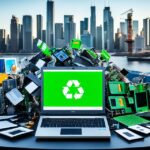The Economic Impact of Laptop Recycling on the Tech Industry
In today’s digital age, the rapid advancement of technology has led to an ever-increasing number of discarded electronic devices, including laptops. However, the repercussions of this electronic waste extend beyond environmental concerns. Laptop recycling has a profound economic impact on the tech industry, shaping the laptop recycling industry in significant ways.
This comprehensive guide aims to explore the economic advantages of laptop recycling. From cost savings through repurposing and reuse to job creation, revenue generation, and material recovery, we will delve into the various aspects of this industry.
Cost Savings Through Repurposing and Reuse: Maximizing ROI on IT Assets
One of the most compelling economic advantages of laptop recycling lies in the potential for significant cost savings through strategic repurposing and reuse of hardware components. Extending the lifespan of existing IT assets can provide a substantial return on investment (ROI). This approach allows for better budget allocation, improves the bottom line, and can be a sustainable business strategy.
When businesses choose to repurpose and reuse their IT assets, they can avoid the costs associated with purchasing new equipment. By implementing sustainable practices, companies can reduce expenses, contributing to their overall cost savings. This is especially beneficial for organizations operating with limited resources or tight budgets.
Moreover, repurposing and reusing IT assets can maximize the ROI on initial investments. Rather than disposing of still-functional laptops, companies can extend their usability by repurposing them for other roles within the organization. For example, upgrading a laptop’s memory or storage capacity can transform it into a valuable asset for employees in different departments or functions.
Repurposing and reusing IT assets not only reduces waste but also allows businesses to maximize the value derived from their initial investments, all while reducing costs and improving the overall ROI.
This cost-effective approach offers several benefits:
- Reduced procurement costs: By repurposing existing hardware, businesses can avoid the need to purchase new laptops, saving money on equipment procurement.
- Lower maintenance and support costs: Extending the lifespan of IT assets means that businesses can delay the need for costly repairs and maintenance, reducing overall support expenses.
- Minimized e-waste disposal costs: Repurposing and reusing laptops significantly reduces e-waste, reducing associated disposal costs and potential environmental impact.
Implementing a comprehensive laptop recycling program that focuses on repurposing and reuse allows businesses to unlock the full potential of their IT assets, resulting in substantial cost savings and maximizing ROI.
Cost Savings Comparison
| Approach | Cost Savings |
|---|---|
| Repurposing and Reusing IT Assets | Significant reduction in procurement, maintenance, and disposal costs |
| Purchasing New Equipment | Higher upfront costs and ongoing maintenance and disposal expenses |
As the table demonstrates, repurposing and reusing IT assets can lead to substantial cost savings compared to purchasing new equipment. By embracing sustainable practices, businesses can achieve financial benefits while contributing to a greener and more environmentally responsible future.
Job Creation and Economic Stimulation through Computer Recycling: A Multiplier Effect on Local Economies
The economic advantages of computer recycling extend beyond cost savings. This environmentally responsible practice also has a significant impact on local economies, creating jobs and stimulating economic growth.
Recycling facilities play a crucial role by offering employment opportunities to individuals with diverse skills and expertise. Technicians specialized in refurbishing hardware, quality control experts, and logistics personnel are just some of the professionals employed in the computer recycling industry. This job creation contributes to the overall economic well-being of local communities.
In addition to recycling facilities, entrepreneurial ventures in e-waste management and community programs further bolster local economies. These initiatives create jobs and inject money directly into the community, providing a multiplier effect on economic stimulation. Local businesses benefit from the increased consumer spending generated by the recycling industry, resulting in a healthier and more vibrant local economy.
“Computer recycling plays a vital role in job creation and economic stimulation at a local level. By promoting sustainable practices and investing in recycling infrastructure, communities can not only protect the environment but also reap the economic rewards,” says Jane Phillips, CEO of GreenTech Solutions.
The Local Economic Benefits of Computer Recycling
The local economic benefits of computer recycling are manifold:
- Job creation: The computer recycling industry offers employment opportunities to a wide range of professionals, contributing to reduced unemployment rates and an improved job market.
- Income generation: Recycling initiatives generate income for individuals and businesses involved in the collection, sorting, and processing of e-waste.
- Community development: The revenue generated from computer recycling activities contributes to community development projects, such as infrastructure improvements and educational programs.
- Small business support: The growth of the computer recycling industry creates opportunities for small businesses to provide ancillary services such as transportation, repair, and resale of refurbished electronics.
The job creation and economic stimulation brought about by computer recycling strengthen local economies and foster sustainable development. By embracing computer recycling practices and supporting the industry, communities can experience long-term economic benefits while promoting a cleaner and greener future.
Revenue Generation through the Sale of Refurbished Electronics: A Sustainable Business Model
Laptop recycling offers a sustainable business model that enables significant revenue generation through the sale of refurbished electronics. As technology continues to advance, the demand for cost-effective and environmentally friendly alternatives to new devices is increasing. This expanding market presents ample opportunities for businesses to turn e-waste into profit while contributing to a circular economy.
Maximizing revenue in the refurbished electronics market requires a strategic approach. Quality assurance is paramount to ensure that refurbished devices meet high standards and provide customers with reliable products. Thorough testing and inspections are essential to build trust and maintain customer satisfaction.
Online platforms play a crucial role in reaching a wider customer base and driving sales. Having a strong online presence, including a user-friendly website and effective marketing strategies, can help businesses showcase their refurbished electronics, attract potential buyers, and generate sustainable revenue.
The market for refurbished electronics is expanding, offering a sustainable business model that turns e-waste into profit.
Pricing strategies also play a vital role in revenue generation. Offering competitive prices for refurbished electronics can attract consumers who are seeking budget-friendly options. Additionally, implementing pricing models that factor in the cost savings achieved through laptop recycling can help maintain profitability while providing reasonable prices to customers.
Benefits of Revenue Generation through Refurbished Electronics
The revenue generation potential of laptop recycling and the sale of refurbished electronics extends beyond profitability. By embracing a sustainable business model, businesses contribute to e-waste recycling efforts, reducing the environmental impact of electronic waste. It also promotes resource conservation by extending the lifespan of existing devices and reducing the need for new production.
This sustainable business approach aligns with the growing consumer demand for environmentally conscious products and supports the transition towards a more circular economy. By investing in e-waste recycling and revenue generation through refurbished electronics, businesses can position themselves as socially responsible and attract eco-conscious customers.
Revenue Comparison – New Electronics vs. Refurbished Electronics
| Metrics | New Electronics | Refurbished Electronics |
|---|---|---|
| Price | Higher | Lower |
| Environmental Impact | Higher | Lower |
| Availability | Depends on stock | Varies, but potentially wider selection |
| Quality | Guaranteed | Tested and verified |
| Cost Savings | N/A | Substantial |
The table above highlights key differences between new and refurbished electronics, showcasing the advantages of choosing the latter. Refurbished electronics offer lower prices, reduced environmental impact, a potentially wider selection, and substantial cost savings. While availability may depend on stock, the quality of refurbished devices is guaranteed through rigorous testing and verification processes.
By capitalizing on revenue generation opportunities through refurbished electronics, businesses can not only achieve financial success but also contribute to a more sustainable future by reducing e-waste and fulfilling consumer demands for eco-friendly alternatives.
Material Recovery and the Circular Economy: Extracting Value from E-Waste
Another important economic advantage of laptop recycling is the potential for material recovery. Electronic devices contain valuable materials like gold, silver, and rare earth metals, which can be extracted for reuse. The responsible recycling of e-waste not only contributes to sustainability but also offers a lucrative revenue stream. Rare earth metals, in particular, are essential in the manufacturing of modern electronics, and their recovery from e-waste is both environmentally responsible and economically strategic. Upcycling and the circular economy also play a role in extracting value from e-waste.
By implementing proper techniques and processes, companies can recover valuable materials from e-waste, contributing to a more sustainable and circular economy. This involves disassembling electronic devices and extracting the reusable materials such as precious metals and rare earth metals. These materials can then be used in the production of new electronic devices, reducing the need for virgin resources and minimizing the environmental impact.
“Material recovery from e-waste is not only environmentally responsible, but it also presents a significant economic opportunity. By extracting valuable materials from discarded electronics, businesses can contribute to a more sustainable future while generating revenue.”
Extracting value from e-waste requires specialized knowledge and expertise. Companies in the recycling industry invest in advanced technologies and employ skilled professionals to ensure efficient material recovery processes. This includes the use of methods like mechanical shredding, separation techniques, and chemical treatments to extract valuable metals and compounds.
The extracted materials, such as gold and silver, can be sold to metal refineries at competitive prices. Rare earth metals, in particular, have a high market value due to their scarcity and importance in various industries. Their recovery from e-waste presents a significant opportunity to meet the growing demand for these critical resources.
Creating a Circular Economy
The concept of a circular economy is central to maximizing the economic benefits of material recovery from e-waste. Rather than following a linear “take-make-dispose” model, a circular economy aims to keep resources in use for as long as possible, minimizing waste and maximizing value extraction. This includes designing products for durability, repairability, and recyclability, as well as implementing efficient recycling and recovery systems.
Furthermore, upcycling can also contribute to the circular economy. By repurposing discarded electronic components, such as circuit boards or displays, into new products or materials, businesses can optimize resource utilization and minimize waste. This not only saves valuable resources but also reduces the environmental impact associated with manufacturing new products from virgin materials.
The combination of responsible material recovery, upcycling, and the circular economy presents a compelling economic case for laptop recycling. It enables businesses to extract value from e-waste, contribute to sustainability, and unlock revenue opportunities. By embracing these practices, companies can align their environmental and economic goals, leading to a more resilient and efficient tech industry.
Conclusion
Laptop recycling has a significant economic impact on the technology industry. By reducing costs through repurposing and reuse, businesses can maximize their return on investment and improve their bottom line. Additionally, laptop recycling stimulates local economies by creating jobs and injecting money directly into the community. This multiplier effect benefits not only businesses but also individuals and the overall economy.
Furthermore, laptop recycling generates revenue through the sale of refurbished electronics. The growing demand for cost-effective and environmentally friendly alternatives to new products presents a sustainable business model. By participating in the refurbished electronics market, businesses can turn e-waste into profit while also contributing to the circular economy. This approach aligns with the growing trend of conscious consumerism and offers long-term economic advantages.
Moreover, laptop recycling provides the opportunity for material recovery from e-waste. Valuable materials like gold, silver, and rare earth metals can be extracted and reused, further adding to the economic benefits. The responsible recycling of e-waste not only reduces environmental impact but also offers a lucrative revenue stream. This value extraction from e-waste plays a crucial role in the transition to a more sustainable and resource-efficient tech industry.
In conclusion, the economic impact of laptop recycling is substantial. The benefits of reducing costs, stimulating local economies, generating revenue, and extracting value from e-waste make laptop recycling a win-win solution for businesses, the environment, and society as a whole. By adopting a strategic approach to laptop recycling, businesses can contribute to environmental sustainability while reaping financial rewards.
FAQ
What are the economic advantages of laptop recycling?
Laptop recycling offers significant cost savings through repurposing and reuse of hardware components, stimulates local economies through job creation, generates revenue through the sale of refurbished electronics, and extracts valuable materials for reuse.
How does laptop recycling provide cost savings?
By extending the lifespan of existing IT assets through repurposing and reuse, businesses can achieve a substantial return on investment, allocate their budget more efficiently, improve their bottom line, and adopt a sustainable business strategy.
How does laptop recycling contribute to job creation and economic stimulation?
Recycling facilities create employment opportunities for technicians, quality control experts, logistics personnel, and other skilled professionals. Entrepreneurial ventures in e-waste management and community programs also contribute to local economies by creating jobs and injecting money into the community.
How can businesses generate revenue through laptop recycling?
Laptop recycling offers revenue generation opportunities through the sale of refurbished electronics. As the demand for cost-effective and environmentally friendly alternatives to new products grows, businesses can capitalize on the expanding market for refurbished electronics by implementing quality assurance measures, leveraging online platforms, and employing effective pricing strategies.
What is the potential for material recovery in laptop recycling?
Electronic devices contain valuable materials such as gold, silver, and rare earth metals, which can be extracted for reuse. Recovering these materials not only contributes to sustainability but also offers a lucrative revenue stream. Rare earth metals, in particular, are crucial components in modern electronics, and their recovery from e-waste is both environmentally responsible and economically strategic.
How does laptop recycling benefit the tech industry?
Laptop recycling reduces costs through repurposing and reuse, stimulates local economies through job creation, generates revenue through the sale of refurbished electronics, and extracts value from e-waste. By taking a strategic approach to laptop recycling, businesses can contribute to environmental sustainability and benefit financially.















